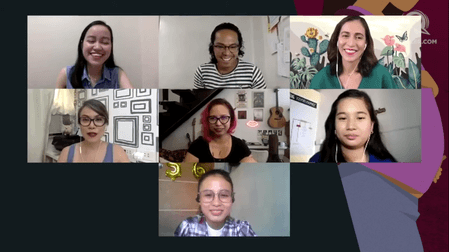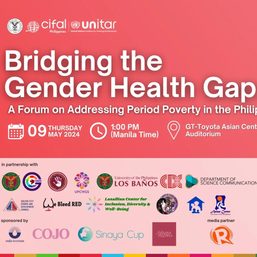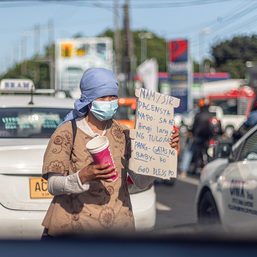SUMMARY
This is AI generated summarization, which may have errors. For context, always refer to the full article.
![[Dash of SAS] Hypersexed teens aren’t behind soaring teen pregnancy rates](https://www.rappler.com/tachyon/2021/11/TL-teen-pregnancy-sq.jpg)
There are not that many Filipino teens having sex, but the Philippines has one of the highest teen pregnancy rates in the region.
That’s what the data says: Birth rates are high, with about 500 teen girls giving birth every day, but sexual activity among teenage girls did not breach 15%.
Teens and their raging hormones and alleged loose morals aren’t the problem when it comes to the country’s soaring teen pregnancy rate. We are. We are failing our young people.
And by we, I mean, the Holy Trinity driving teen pregnancy.
First is our government, for passing the Reproductive Health Law meant to liberalize access to birth control and services but insisting on parental consent before teens can avail of these services at government clinics. As if there are teens who are going to tell their parents they are sexually active or planning to have sex.
Second is our school system, for dragging their feet on implementing a comprehensive sexuality education program in schools. The implementation of this curriculum was outlined in the passage of the Reproductive Health Law, which was passed in 2012. That was more than 10 years ago; however, implementation has not gone beyond a “pilot stage.” According to this report, “Most teachers intend to implement comprehensive sexuality education but only a few have started.”
Remember when one lawmaker suggested that there be separate classrooms for boys and girls to prevent teen pregnancy? Sex isn’t happening in the classrooms. According to data provided by the Philippine General Hospital, it is in the home where kids most likely first had sex.
Since, on the average, there are 500 teenage girls who become pregnant every day, imagine how many teen pregnancies could have been prevented in the years that have passed.
And third is us, as a society, for stigmatizing teens for tentatively exploring their sexuality and discriminating teen mothers.
Teens do not have access to proper sex education that will teach them about their bodies and inform them about the relational aspects of consent and healthy relationships. They don’t have access to birth control, and when they fail, we pulverize them with social condemnation.
There are a number of studies that show that when teens are given the proper information they need about sex and sexuality, they are in a better position to plot out cause-and-effect scenarios and take necessary safety measures.
Teen pregnancy is preventable. Meaning, medical advancements from the ’70s made it possible to have sex without necessarily getting pregnant.
If we are serious about addressing teen pregnancy, which has been declared a “national priority,” we need to stop infantilizing teens and thinking of them as children rather than growing adults who are coming of age, just beginning to understand themselves and their bodies and shaping their identities. I say the beginning, because getting to know ourselves is a lifelong process that only starts during the teen years.
What teens need is a safe space to do it, armed with proper education, not judgement and the constant prohibition that denies their ability to think for themselves or completely dismisses their right to pleasure in their consensual romantic relationships with a peer.
We expect teens to close their eyes and pray. Meanwhile, everything around them is telling them to have sex. From TV programs with girls in clothes that do not leave much to the imagination gyrating their hips, to the erotica and pornography that is everywhere, and to the sexual innuendo that we casually inject in our everyday conversations.
How do we expect teens to safely navigate this space?
Teens don’t need our condemnation or our judgement. They need our support.
I say this because I still remember what it was like to be a teenager. It was confusing. (Even as an adult, it can still get confusing.) I thought I knew everything, but I didn’t. I was angsty but didn’t know any other way to be. I felt the need to be validated, seen, and loved by people other than my parents – who were supposed to love me anyway – but was always dismissed as being rebellious and not knowing any better.
We are failing our young people miserably.
We cannot wait for the government to make its laws more inclusive to teens. We cannot wait for DepEd to implement a sex education curriculum and to think of ways for this essential information to reach teens who are not in school and are most vulnerable. We cannot wait for our social norms to change.
Our young people need us now.
At a webinar about teen pregnancy prevention on November 6, sponsored by the Likhaan Center for Women’s Health, there were a number of comments that went along the lines of, “This is information that we wished I knew when I was younger.” One viewer was watching the webinar with their kid, which made many of us happy because it signaled more open, honest conversations about sex between parents and their children.
All of us have a young person we know and care for. For them, we can be the adult we wish we had when we were growing up. Let’s champion our young people and support their dreams. Let’s acknowledge that safely exploring their sexuality is a part of growing up and defining their identity and their success later on in life.
Young people need to feel empowered with information so they can own their bodies and their future. – Rappler.com
Ana P. Santos writes about gender and sexuality and its intersections with labor migration. You can find her other work on Facebook at Sex and Sensibilities and on Medium. She is currently pursuing a postgraduate degree in Gender (Sexuality) at the London School of Economics and Political Science.
Add a comment
How does this make you feel?



![[DASH of SAS] Lessons about intersections of migrant life, sexuality, inter-racial relationships](https://www.rappler.com/tachyon/2023/12/TL-Lessons-migrant-life-December-27-2023.jpg?resize=257%2C257&crop_strategy=attention)








![[Dash of SAS] Making abortion a constitutional right](https://www.rappler.com/tachyon/2024/03/Its_true_-_Flickr_-_Josh_Parrish-1.jpg?resize=257%2C257&crop=125px%2C0px%2C768px%2C768px)
![[OPINION] Unpaid care work by women is a public concern](https://www.rappler.com/tachyon/2024/07/20240725-unpaid-care-work-public-concern.jpg?resize=257%2C257&crop_strategy=attention)
![[DECODED] The Philippines and Brazil have a lot in common. Online toxicity is one.](https://www.rappler.com/tachyon/2024/07/misogyny-tech-carousel-revised-decoded-july-2024.jpg?resize=257%2C257&crop_strategy=attention)


![[OPINION] Why women seek divorce](https://www.rappler.com/tachyon/2024/06/TL-women-seeking-divorce-june-14-2024.jpg?resize=257%2C257&crop_strategy=attention)
There are no comments yet. Add your comment to start the conversation.